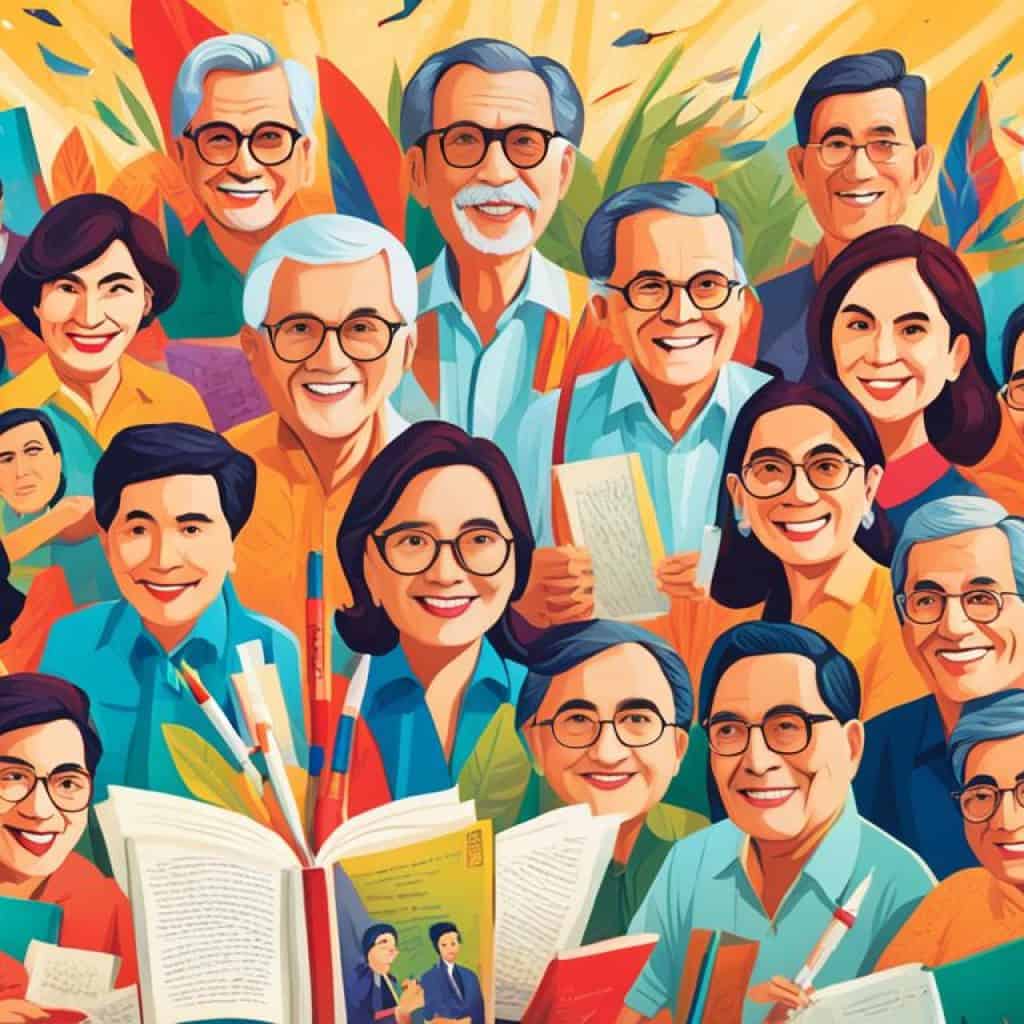Have you ever wondered who the masterminds behind the captivating stories and thought-provoking literature of the Philippines are? Dive into the realm of Philippine literary figures and discover the brilliance of famous writers who have left an indelible mark on the country’s cultural landscape.
From the intriguing tales of F. Sionil José to the poetic genius of Francisco Balagtas, these remarkable Filipino authors have shaped the literary consciousness of the nation, sparking conversations and challenging societal norms. With their powerful words, they have brought to life the struggles, triumphs, and complexities of the Filipino people.
Join us on a journey to unravel the narratives woven by these literary icons and discover the enduring legacy they have left behind. Explore their works, their impact, and the rich diversity of Philippine literature that continues to inspire readers and writers alike.
Key Takeaways:
- Explore the life and legacy of F. Sionil José, a prominent writer and publisher who revolutionized Philippine literature.
- Delve into the Rosales Saga, an epic five-novel series by F. Sionil José that portrays the social struggles of the Philippines.
- Discover the poetic brilliance of Francisco Balagtas, the Great Filipino Poet whose works continue to resonate with readers.
- Uncover the role of Jose Rizal, the Philippine national hero, in shaping Philippine literature through his novels and poetry.
- Appreciate the English-language masterpieces of Nick Joaquin, a renowned Filipino writer who blurred the boundaries of Philippine literature.
F. Sionil José: A Literary Icon
F. Sionil José stands as a beacon of literature in the Philippines, recognized as a highly acclaimed Filipino writer. Born on December 3, 1924, in Rosales, Pangasinan, José’s literary contributions have left an indelible mark on Philippine literature.
A multifaceted figure, José’s influence extends beyond his writing. He founded the Philippine Center of PEN International, a prestigious organization promoting literature and fostering connections among writers worldwide.
An advocate for nurturing local artistic talent, José established the Solidaridad Bookshop and Publishing House, providing a platform for aspiring Filipino authors to publish their works. Additionally, he founded Solidarity, a renowned journal, amplifying the voices of writers and artists throughout Asia and the Pacific region.
Having earned numerous accolades for his remarkable contributions, José’s exceptional talent garnered esteemed recognition. He was awarded the esteemed Ramon Magsaysay Award, known as the Asian equivalent of the Nobel Prize. The Cultural Center of the Philippines Centennial Honors for the Arts paid tribute to José’s literary brilliance. Further attesting to his literary prowess, José was honored with the Order of Sacred Treasure by the Emperor of Japan.
The Rosales Saga: A Literary Masterpiece
When exploring the works of F. Sionil José, it is impossible to overlook his captivating epic series, the Rosales Saga. This remarkable five-novel collection stands as a testament to José’s prowess as a writer and his significant contributions to Philippine literature.
The Rosales Saga delves into the lives of multiple generations within the Samson family, providing a poignant portrayal of their triumphs, sorrows, and enduring resilience in the face of social struggles in the Philippines. Each novel within the series offers a unique perspective, seamlessly weaving together the rich tapestry of Filipino history, culture, and human experience.
“The Rosales Saga is a literary masterpiece that combines powerful storytelling with a profound exploration of the Filipino spirit. With meticulous attention to detail and a keen understanding of societal dynamics, José captures the essence of the Philippines and its people. Through the struggles and dreams of the Samson family, readers are transported to the heart of a nation.”
Novels in the Rosales Saga:
| Novel | Description |
|---|---|
| The Pretenders | An introspective journey through the lives of two brothers, set against a backdrop of political unrest and social change. |
| Tree | An exploration of identity, heritage, and the enduring connection to one’s roots. |
| My Brother, My Executioner | A tale of friendship, loyalty, and sacrifice amidst the turmoil of the Philippine Revolution. |
| Mass | Examines the complexities of religion, faith, and the clash between tradition and progress. |
| Po-on | A journey through time, showcasing the struggles and aspirations of the Samson family across generations. |
Each novel in the Rosales Saga is a standalone masterpiece, but when read collectively, they form a cohesive and vivid narrative that resonates deeply with readers. F. Sionil José’s impeccable storytelling and evocative prose bring the characters to life, transporting readers to the heart of the Philippines and immersing them in the rich tapestry of its history and culture.
Through the Rosales Saga, F. Sionil José cements his position as one of the most influential and revered figures in Philippine literature. His remarkable body of work continues to inspire and captivate readers worldwide, making the Rosales Saga an essential cornerstone of the Filipino literary canon.
Francisco Balagtas: The Great Filipino Poet
Francisco Balagtas, also known as Balagtas, is hailed as the Great Filipino Poet, leaving an indelible mark on Philippine literature. Writing in the Tagalog language, his works are characterized by allegorical themes and metaphorical allusions, captivating readers with their depth and resonance.
Florante at Laura, his epic poem, stands as one of the cornerstones of Philippine literature, showcasing Balagtas’ mastery of storytelling and poetic craftsmanship. This literary masterpiece weaves a tale of triumph, love, and heroism, capturing the essence of Filipino culture and identity. Its powerful influence has reverberated across generations, shaping the cultural landscape of the Philippines.
In recognition of his contribution to literature, Balagtasan, a Filipino form of extemporaneous verse debates, was named after him. This dynamic art form embodies the spirit of Balagtas’ poetic brilliance, encouraging the exploration of profound ideas through lyrical expression.

“The Great Filipino Poet Francisco Balagtas’s works continue to inspire and resonate with readers, showcasing the transformative power of literature.”
| Key Achievements | Significance |
|---|---|
| Author of Florante at Laura | A foundational piece of Philippine literature, influencing subsequent generations of writers. |
| Invention of Balagtasan | A cultural tradition that fosters poetic expression and intellectual discourse. |
| Legacy as the Great Filipino Poet | A symbol of artistic excellence and a source of inspiration for future poets and writers. |
Jose Rizal: The National Hero and Writer
Jose Rizal, widely recognized as the Philippine national hero, left an indelible mark on Philippine literature. Through his literary works, he fearlessly exposed the social injustices and abuses inflicted by the Spanish colonial government, igniting the flames of revolution in the hearts of the Filipino people.
Rizal’s most renowned novels, Noli Me Tangere and El Filibusterismo, served as powerful catalysts for change during a time of immense oppression. In Noli Me Tangere, Rizal skillfully crafted a narrative that delved deep into the heart of Filipino identity, shedding light on the harsh realities faced by his fellow countrymen.
“I have written this novel not for the praise of the exacting critic nor to satisfy the vain glory of the scholar but to disclose some truths […] that my country may thereby be better known to others and that my countrymen may find in it an open book where they can read about themselves.”
The sequel, El Filibusterismo, further evidenced Rizal’s unwavering commitment and dedication to the Filipino cause. With both novels serving as powerful tools for awakening national consciousness, Rizal became a beacon of hope and inspiration for his compatriots.
Indeed, Rizal’s literature played a pivotal role in fueling the fire of the 1896 Philippine Revolution, which ultimately led to the country’s independence from colonial rule.
Before facing his tragic fate, Rizal penned his final poem, Ultimo Adios, a poignant expression of his love for his country and his unwavering dedication to the Filipino people.
“Farewell, beloved Country, treasured region of the sun, Pearl of the Orient Sea, our vanquished Eden! To you I gladly surrender this melancholy life; And were it brighter, fresher, more florid, Even then I would give it to you, inasmuch as you give it to me.”
Rizal’s patriotism, courageous spirit, and literary brilliance immortalize him as a monumental figure in Philippine history and literature. His enduring legacy continues to inspire generations of Filipinos and serves as a constant reminder of the power of words to spark change and shape a nation.
The Impact of Rizal’s Writing
Rizal’s novels, Noli Me Tangere and El Filibusterismo, awakened the Filipino people to the injustices and hardships they faced under Spanish rule. These works ignited a sense of national identity and unity, fueling the flames of revolution and ultimately leading to the fight for Philippine independence.
- Rizal’s novels exposed the oppressive policies and corruption of the Spanish colonial government.
- They shed light on the social inequalities and abuses endured by the Filipino people.
- The novels sparked conversations about nationalism, freedom, and the desire for self-governance.
- Rizal’s execution following the publication of his works further galvanized the Filipino people, solidifying his status as a martyr for national liberation.
Rizal’s contribution to Philippine literature extends beyond his novels. His essays, poems, and political writings also played a significant role in shaping public consciousness and mobilizing the Filipino people towards a common cause.
Nick Joaquin: The English-Language Master
Nick Joaquin, a renowned Filipino writer, firmly established his mastery in English-language literature. His distinct writing style seamlessly incorporated Filipino identities, foreign influences, and ancient mythical superstitions, creating a unique blend of cultures and perspectives. Joaquin, often referred to as “the Renaissance man of Philippine letters,” captivated readers with his gothic short stories set against the backdrop of war, delving deep into the intricacies of religion and culture, and their profound impact on the Filipino psyche.
One of Joaquin’s notable works is The Woman Who Had Two Navels, a novel and one of his most celebrated literary contributions. It delves into the complexities of identity and colonial history, reflecting the broader socio-political landscape of the Philippines. Through his storytelling prowess, Joaquin shed light on the inner struggles faced by individuals as they navigate the complexities of nationality, tradition, and personal growth.
“… it is when you look upon the face of chaos, as it were, and make it out, for the first time, to be a universe. That’s what she wanted; a universe created for her and by her. To have the feeling of being unique, of being visited with the incredible experience that what was happening now was happening only to her, and that the universe had at last taken form.”
As a testament to his remarkable contributions to Philippine literature, Joaquin was honored with the prestigious rank and title of National Artist for Literature in 1976. Drawing inspiration from both local and global influences, he masterfully crafted stories that resonated with readers, making him an icon of English-language literature in the Philippines.
National Literature Month: Celebrating Philippine Literature
National Literature Month is a momentous occasion in the Philippines, celebrated annually throughout the month of April. Organized by the National Commission for Culture and the Arts (N.C.C.A.), this month-long celebration pays tribute to the rich and diverse literary heritage of Philippine literature.
The primary objective of National Literature Month is to recognize the invaluable contributions of esteemed writers and scholars to Philippine literature. It serves as a platform to honor their significant works and their role in shaping the cultural legacy of the country.
During National Literature Month, a wide range of activities are organized to engage both established writers and aspiring ones. These include webinars, where participants can gain insights from renowned authors and industry experts, and competitions, providing opportunities for budding writers to showcase their talent.
“National Literature Month is a time to celebrate the power of language and storytelling, and to appreciate the role of literature in fostering cultural identity,” says Dr. Maria Del Carmen S. Bautista, Chairperson of the N.C.C.A.
Throughout the month, literary events and festivals take place across the country, fostering a sense of community among writers, readers, and literary enthusiasts. These events offer a platform for literary discussions, readings, and interactions, creating an environment that promotes the love for Philippine literature.
Join us in celebrating National Literature Month, and embrace the rich cultural tapestry of Philippine literature.

| Key Highlights of National Literature Month | Significance |
|---|---|
| Webinars | Opportunity to learn from established authors and industry experts |
| Competitions | Showcase and recognize budding writers |
| Literary Events and Festivals | Promote community engagement and appreciation of literature |
Evolution of National Literature Month
National Literature Month in the Philippines was established by the National Commission for Culture and the Arts (N.C.C.A.) in 2015 as a way to celebrate the rich 500-year history of literature in the country. Since its inception, this annual event has undergone significant evolution, expanding its activities and offerings to engage and inspire literature enthusiasts of all ages.
One notable addition to National Literature Month is the inclusion of literary competitions. These competitions provide a platform for high school and college students to showcase their literary talents and creativity. It allows them to explore different genres and express themselves through various forms of writing.
National Literature Month has become an exciting opportunity for aspiring young writers to shine and receive recognition for their literary prowess.
Moreover, online competitions for Ivatan literary forms have been introduced to celebrate the unique literary heritage of the indigenous Ivatan people. These competitions allow participants to delve into the Ivatan language and literature, contributing to the preservation and promotion of this cultural treasure.
In recognition of the growing interest in creative writing, National Literature Month also offers creative writing workshops. These workshops provide aspiring writers with valuable guidance, techniques, and inspiration to enhance their storytelling abilities and refine their craft.
Throughout National Literature Month, the Philippine International Literary Festival takes center stage as a prominent platform for discussions, lectures, and celebrations. This festival brings together renowned writers, scholars, and literature enthusiasts from across the country to exchange ideas, share insights, and celebrate the power of literature in shaping culture and society.
As National Literature Month continues to evolve, it remains an essential part of the Philippine literary landscape. It not only pays homage to the country’s literary heritage but also seeks to foster a vibrant and thriving literary community. By embracing new activities and opportunities, National Literature Month ensures that literature remains a dynamic and ever-evolving art form in the Philippines.
Importance of Philippine Literature Diversity
Philippine literature is a treasure trove of diverse stories, poems, and narratives that reflect the rich history and cultural heritage of the country. It encompasses various genres and forms, written in native languages like Filipino, Spanish, and English. The diversity of Philippine literature is of utmost significance, as it allows for a deeper understanding of the country’s various identities, experiences, and influences.
Through its diverse range of voices and perspectives, Philippine literature captures the essence of different regions, communities, and historical periods. It serves as a medium to preserve and inspire Filipino values, traditions, and literature for generations to come. This diversity fosters cultural appreciation and fosters inclusivity within the literary landscape, showcasing the vibrant tapestry that is Philippine literature.
The cultural heritage embedded within Philippine literature is a source of pride and national identity. It highlights the resilience, creativity, and wisdom of the Filipino people, acting as a testament to their rich cultural heritage. By embracing and celebrating this diversity, Philippine literature opens doors to cross-cultural exchanges and fosters a greater appreciation and understanding among readers worldwide.
“In diversity, there is beauty and strength. Philippine literature stands as a testament to the richness of our cultural heritage, embracing various languages, perspectives, and traditions.” – Philippine Literary Society
Literary Opportunities and Engagements
During National Literature Month, writers and literature enthusiasts have the chance to participate in various activities that celebrate and promote Philippine literature. These opportunities provide platforms for individuals to engage, showcase their skills, and connect with like-minded individuals within the literary community.
Writing Competitions: Sharpen Your Skills and Win Prizes
Writing competitions held as part of National Literature Month offer aspiring writers the chance to develop their craft and compete for exciting prizes. Whether it’s a short story, poetry, or essay contest, these competitions provide a valuable opportunity to refine writing abilities and gain recognition for literary achievements.
Literary Awards Ceremonies: Recognizing Exemplary Filipino Writers
Literary awards ceremonies held during National Literature Month honor the outstanding contributions of Filipino writers to the literary landscape. These events recognize exemplary works in various genres, such as novels, poetry collections, and non-fiction. By acknowledging the talents and accomplishments of writers, these awards ceremonies inspire the future generation and elevate the status of Philippine literature.
Literary Festivals: Celebrating the Joy of Reading and Creativity
Literary festivals are vibrant gatherings that bring together readers, publishers, and creatives to celebrate literature in all its forms. These events feature panel discussions, book launches, workshops, and performances, creating an immersive and inspiring environment for literature enthusiasts. Attending a literary festival during National Literature Month provides a unique opportunity to engage with the literary community, discover new voices, and gain insights into the evolving landscape of Philippine literature.

As National Literature Month unfolds, writers and literature enthusiasts can seize these literary opportunities to enhance their skills, gain recognition, and become an integral part of the vibrant Philippine literary scene.
Fun Facts about Literature
Literature is not only a source of knowledge and entertainment but also a treasure trove of fascinating facts and trivia. These interesting nuggets add an extra layer of intrigue to the world of literature, highlighting the creativity and uniqueness found within famous books and the literary sphere. Here are some captivating literary facts to pique your curiosity:
- Bill Gates bought the world’s most expensive book: The renowned tech billionaire purchased Leonardo da Vinci’s “Codex Leicester” for a staggering $30.8 million, making it the most expensive book ever sold.
- Victor Hugo’s longest sentence: In his classic masterpiece “Les Misérables,” Victor Hugo crafts a sentence spanning an astonishing 823 words. This literary feat captivates readers with its intricate construction and extensive description.
- The first novel written on a typewriter: Mark Twain’s beloved novel “The Adventures of Tom Sawyer” holds the distinction of being the first-ever novel to be written on a typewriter, revolutionizing the writing process and showcasing the evolving technological landscape.
These fun facts offer a glimpse into the remarkable world of literature, where creativity knows no bounds. They serve as a reminder of the diverse and captivating nature of famous books and the talented authors behind them.
The Meaning and Types of Literature
Literature is a diverse and captivating form of artistic expression that has endured throughout history. It encompasses a wide range of written works that exhibit lasting artistic value. From poetry to prose, science-fiction to drama, literature offers a rich tapestry of storytelling techniques and styles.
At its core, literature serves as a medium for authors to convey their thoughts, emotions, and insights to a wider audience. It provides a platform for contemplation, reflection, and understanding of the human experience. Through literature, readers are transported to different worlds, introduced to compelling characters, and exposed to thought-provoking ideas.
Types of Literature
Literature can be categorized into various types, each with its own distinct characteristics and purpose. These types include:
- Poetry: Poetic literature is often characterized by its rhythmic and expressive use of language. It employs vivid imagery, metaphor, and symbolism to evoke emotions and create a powerful impact on the reader.
- Prose: Prose literature consists of written works in a natural, flowing style. It encompasses a wide range of genres, such as novels, short stories, and essays.
- Science-fiction: Science-fiction literature explores imaginative and futuristic concepts. It often combines scientific elements with speculative ideas to create compelling narratives.
- Drama: Dramatic literature is intended to be performed on stage or screen. It features dialogue-driven storytelling and explores complex themes through the interactions of characters.
- Fable: Fables are short stories that typically convey moral lessons through the use of anthropomorphized animals or inanimate objects as characters.
- Autobiography: Autobiographical literature tells the life story of the author, providing personal insights into their experiences, achievements, and challenges.
- Biography: Biographical literature focuses on the life and achievements of a particular person, offering a detailed account of their personal and professional journey.
Each type of literature brings its own unique flavor to the literary world, catering to different reader preferences and interests. Whether it’s the lyrical beauty of poetry, the immersive storytelling of a novel, or the thought-provoking themes explored in drama, there is a type of literature to captivate every reader.
The image above visually represents the different types of literature, showcasing the breadth and diversity within the realm of literary works.
Ways to Participate in National Literature Month
National Literature Month offers a range of exciting opportunities for individuals to actively engage in the celebration of Philippine literature. Whether you are an aspiring writer, an avid reader, or simply someone who appreciates the power of words, there are several ways you can participate and contribute to this vibrant month-long event.
Enter Literary Competitions
If you have a passion for writing and want to showcase your talent, participating in literary competitions is an excellent way to get involved. These competitions provide a platform for you to sharpen your skills, receive feedback from professionals in the field, and gain recognition for your work. From short story contests to poetry slam events, there is a competition suited to every literary genre and style.
Attend Webinars on Literature and Arts
Webinars are a convenient and accessible way to expand your knowledge and engage with the literary community. These online events bring together renowned authors, scholars, and experts to discuss a wide array of topics related to literature and the arts. Whether it’s a panel discussion on the impact of Philippine literature or a workshop on creative writing techniques, webinars provide valuable insights and inspiration.
Join Literary Events and Festivals
One of the most exciting aspects of National Literature Month is the opportunity to immerse yourself in literary events and festivals. These gatherings celebrate the beauty of Philippine literature, providing an enriching experience for attendees. From book fairs and author book signings to literary conferences and panel discussions, these events offer a chance to connect with fellow literature enthusiasts, network with professionals in the field, and explore the diverse literary landscape of the Philippines.
By actively participating in these literary competitions, webinars, and events during National Literature Month, you can contribute to the preservation and promotion of Philippine literature. Whether you are a seasoned writer or a literature enthusiast, these activities offer a chance to engage with the literary community, gain insights, and foster a deeper appreciation for the power of words.
Conclusion
National Literature Month in the Philippines is a vibrant celebration of the country’s literary heritage. This month-long event showcases the significant contributions of famous writers such as F. Sionil José, Francisco Balagtas, Jose Rizal, and Nick Joaquin. These notable Filipino writers have left an indelible mark on Philippine literature and have become icons in their own right.
The festivities during National Literature Month aim to promote the diversity of Philippine literature and inspire the younger generation. Through various awards, exemplary writers are honored for their exceptional talent and dedication to their craft. This celebration highlights the power of literature in shaping culture and society, and serves as a reminder of the richness and depth of Philippine literary heritage.
As the country celebrates National Literature Month, it is an opportune time to appreciate the works of these top writers from the Philippines. Their contributions have not only brought international recognition to Philippine literature but also sparked pride and inspiration among Filipinos. Their literary masterpieces continue to captivate readers and serve as a testament to the creativity, talent, and resilience of the Filipino people.


















Add comment